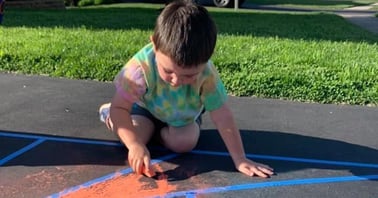 Educators have been aware of summer slide or a regression in academic progress over the summer months since a comprehensive study was published almost twenty-five years ago (Charlton, K, Cooper, H, Greathouse, S, Lindsay, J, Nye, B, 1996). Especially during a period of uncertainty when many families may be spending more time at home, Sanford School teachers are here to share ideas that will encourage continued academic growth and stability throughout the summer months. Setting up a consistent schedule in the summer filled with educational activities will help continue your child's learning throughout elementary school.
Educators have been aware of summer slide or a regression in academic progress over the summer months since a comprehensive study was published almost twenty-five years ago (Charlton, K, Cooper, H, Greathouse, S, Lindsay, J, Nye, B, 1996). Especially during a period of uncertainty when many families may be spending more time at home, Sanford School teachers are here to share ideas that will encourage continued academic growth and stability throughout the summer months. Setting up a consistent schedule in the summer filled with educational activities will help continue your child's learning throughout elementary school.
PreK
- Read to your child. Make it fun! Have them use finger tracking when reading to help them develop foundational reading skills. As they read, ask them questions about what is happening so they can learn that print has meaning, and you can check their understanding.
- Practice counting with your child. Use toys or treats to help your child learn one-to-one correspondence by counting out objects like M&M’s. For example, show them numbers 1-10 and ask them to count out that many objects.
- Give your child responsibilities at home, like setting the table.
Kindergarten
- Practice sight words in engaging ways. Create a hopscotch grid with their words. Allow them to write their sight words with shaving cream on the wall in the tub. Send them on a scavenger hunt for different sight words around your home.
- Read aloud different genres to your child and introduce them to various story types. Make it fun by taking them out for a picnic and reading in a park.
- Encourage them to write journal reflections from their week about their feelings or what activities they did.
1st Grade
- Read appropriately leveled books with your child to encourage their skill. To build interest in longer stories, read a chapter book to them before bed or snack.
- Visit your local library or the online catalog to find great books for your child to read.
- Practice math facts by rolling two dice, adding, and subtracting the digits.
- Have them send postcards, letters, or emails to family and friends to practice writing.
2nd Grade
- Suggest that your child research people or places (i.e. Walt Disney or Disney World) and present their findings to the family. This activity will engage them with reading, writing, and public speaking.
- Implement a reading routine so your child reads at a specific time each day.
- Cook together! Recipes will help children learn both reading and math skills.
- Bring an audiobook for the car on your next road trip!
3rd Grade
- Read, read, read. It cannot be stressed enough.
- Practice math facts--especially addition, subtraction, and multiplication.
- Utilize optional reading, math, and writing packets if provided by your child’s teacher.
- Consider enrolling your child in camp (in-person or virtually) to keep them engaged in organized activities with peers.
- If you feel it would benefit your child, summer is a great time to enlist outside support (i.e. a tutor) to make sure they are ready for the fall. Many classroom teachers will tutor students over the summer.
4th Grade
- We recommend having your child practice their math facts three times a week to help them master them. Practice math skills by using free apps like Happy Numbers or Sushi Monster. Find other educational apps on Common Sense Media's Best Apps: Our Recommendations for Families.
- Enlist their help in solving real-life problems such as making change at the grocery store or estimating the bill.
- Write letters to family and friends—maybe to grandparents if they are unable to see them during the pandemic.
- Have them record their experience of the summer in a journal. Documenting their time living through COVID-19 will probably be interesting to them someday.
- Encourage them to read anything of their choice to develop a love of books.
Teachers are always a great resource when you need ideas to help your child, so make sure to ask if you need help! Sanford faculty support families over the summer and help ensure their students continue to thrive even when they are not in their classrooms by providing valuable resources to continue learning. Having your child practice important skills daily will benefit them and prepare them for their new lessons this fall.
References
Charlton, K, Cooper, H, Greathouse, S, Lindsay, J, Nye, B. The Effects of Summer Vacation on Achievement Test Scores: A Narrative and Meta-Analytic Review. Review of Educational Research. Vol. 66, No. 3 (Autumn, 1996), pp. 227-268.
Susan Bachtle's continual commitment to professional development in order to consistently improve her craft is applauded and admired by all who know her. She was invited by the esteemed Gates Foundation to attend meetings in Seattle and Washington, D.C. focused on the future of education in our country. Sue also serves as an ambassador for Gynzy, an interactive SmartBoard software company that provides state of the art instructional tools to teachers and Osmo, a groundbreaking system that fosters social intelligence and creative thinking on the iPad. Currently, Sue teaches 4th grade at Sanford School.
Kathy Dabkowski loves getting to know the whole child, and she's been working with Sanford families for 32 years. She is a graduate of the University of Delaware as well as Widener University, and her favorite part of teaching is being able to creatively adapt to the needs of different children. Fun fact about Kathy: One of her most cherished memories is of spending two weeks in Africa on safari! Kathy is currently teaching 1st grade at Sanford School.
Ann Marie Galasso attended Radford University for her undergraduate studies and Wilmington University for her graduate degree. Ann Marie believes that learning involves the whole child, and she knows that the Sanford community embraces this idea. Fun fact about Ann Marie: she attended Sanford School from 1st grade through 12th grade, and has several Sanford teachers to thank for her love of learning! She currently teaches 2nd grade at Sanford School.
Beth Kosinski started her teaching career at Sanford in 2004. A graduate of the University of Delaware, and a mother of two Sanford graduates, Beth has spent her experience teaching 1st grade and Kindergarten. Next year, she will be transitioning to leading a PreK class.
Candyce Pizzala has dedicated her over 30-year career to teaching at Sanford School, sharing her love for children and passion for teaching with countless students. She embodies Sanford's mission to educate the whole child, believing character development is as important as teaching the academics. Candyce has connected with students outside of the classroom by volunteering as a coach for Girls on the Run and as a faculty advisor for the Winter Running Club, Go Girls. Candyce is currently teaching third grade at Sanford School.
Patti Reynolds is a Sanford “lifer” having attended Sanford School from preschool through high school graduation. She received her bachelor's degree from Ursinus College before returning to her alma mater as a teacher. Patti has three children who are all graduates of Sanford. She is currently a PreK teacher at Sanford School.








